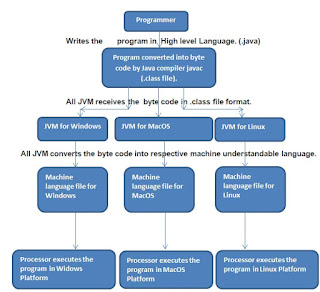| << Previous Chapter | Next Chapter >> |
Java is a platform independent language, which means the java program
can be executed on any platform in the world, whether it is a different architecture
hardware / processor or different operating system like Linux / Unix, Macintosh,
Windows etc.
Let’s discuss how it is achieved in java, let’s take a real example so
that it will be easy to understand the platform independency.
This is the scenario - I am an Indian and I have written a letter in Hindi
language (Hindi is a national language of India), and obviously no one in the
world knows Hindi language except Indians. Now, let’s assume that I have hired multiple
agents who know Hindi and the native language for separate countries, for example
I have hired an agent for America who knows Hindi and US English, an agent for
China who knows Hindi and Chinese, an agent for France who knows Hindi and French,
similarly for other countries as well.
In exactly similar way the java has implemented and ensured the platform
independency. Here we can assume the Hindi
language as a Byte Code, and respective
agents as Java Virtual Machines. The
programmer writes program in high level language, then java compiler convert
the program in byte code and generates the “.class” file, the .class is equivalent
to Letter in Hindi Language, further the byte code is converted to machine
understandable language by Java Virtual Machine which is equivalent to the respective Country Agents.
So, the complete java platform is a ensured platform independency in
this way, which can be executed in any hardware architecture or any operating
system. We just need to install machine or OS specific JVM / JRE in order to execute
the java byte code.
| << Previous Chapter | Next Chapter >> |



No comments:
Post a Comment